Bat Yam
Bat Yam (Hebrew: בַּת יָם or בַּת־יָם ![]() (audio) ) is a city located on Israel's Mediterranean Sea coast, on the central coastal strip just south of Tel Aviv. It is part of the Gush Dan metropolitan area and the Tel Aviv District. In 2020, it had a population of 160,000.[2]
(audio) ) is a city located on Israel's Mediterranean Sea coast, on the central coastal strip just south of Tel Aviv. It is part of the Gush Dan metropolitan area and the Tel Aviv District. In 2020, it had a population of 160,000.[2]
Bat Yam
בַּת יָם | |
|---|---|
City (from 1958) | |
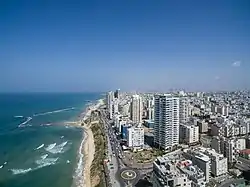 | |
 Flag 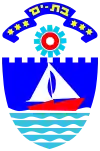 | |
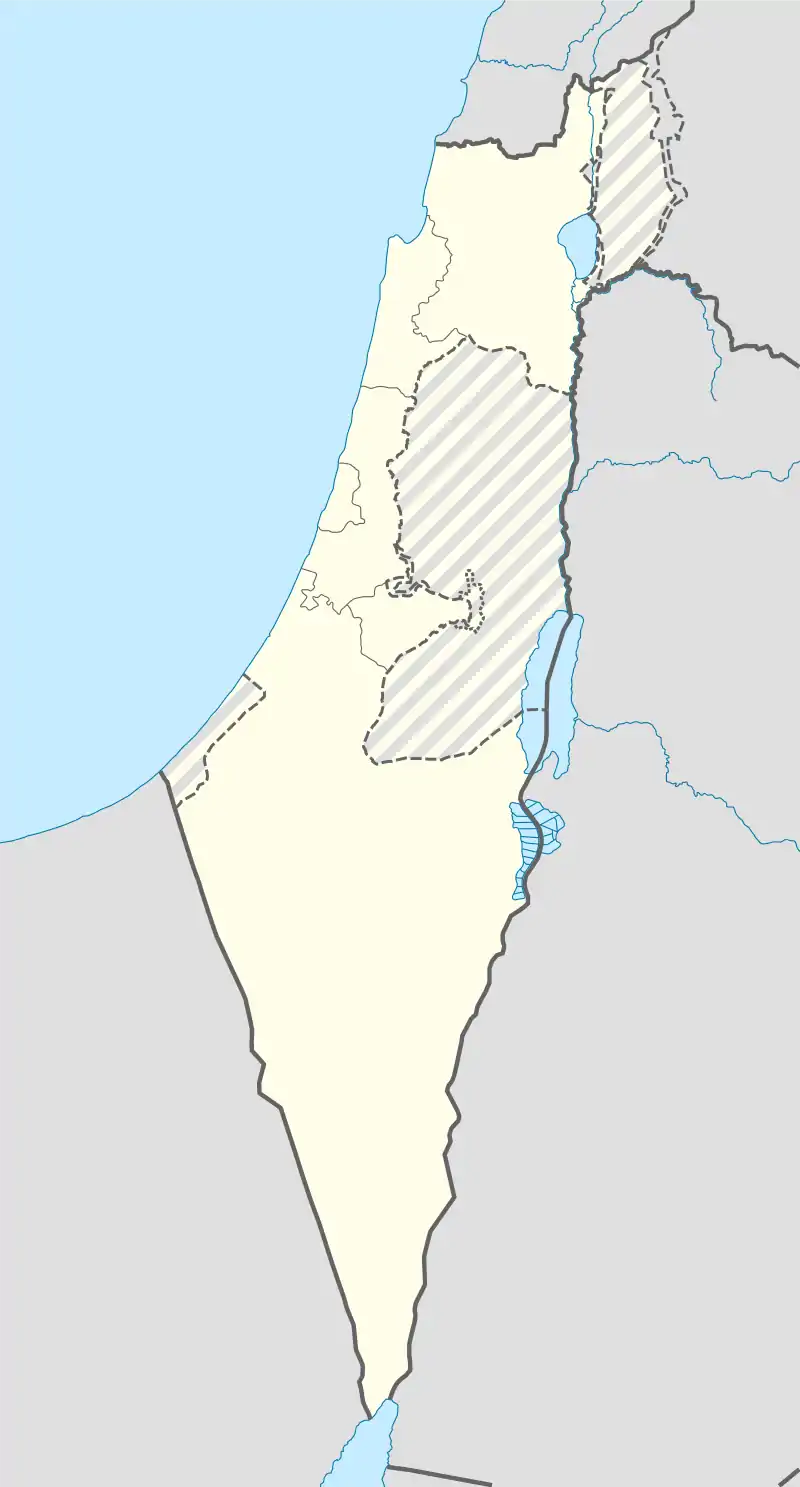 Bat Yam 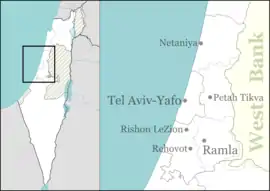 Bat Yam | |
| Coordinates: 32°01′N 34°45′E | |
| Country | |
| District | |
| Founded | 1926 |
| Government | |
| • Mayor | Tzvika Brot |
| Area | |
| • Total | 8,160 dunams (8.16 km2 or 3.15 sq mi) |
| Population (2019)[1] | |
| • Total | 129,012 |
| • Density | 16,000/km2 (41,000/sq mi) |
| Name meaning | lit. 'Daughter of the sea', also 'mermaid' |
| Website | www.bat-yam.muni.il |
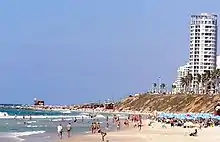
History
| Year | Pop. | ±% |
|---|---|---|
| 1948 | 2,300 | — |
| 1955 | 16,000 | +595.7% |
| 1961 | 31,700 | +98.1% |
| 1972 | 100,100 | +215.8% |
| 1983 | 128,700 | +28.6% |
| 1995 | 138,500 | +7.6% |
| 2008 | 130,300 | −5.9% |
| 2010 | 130,400 | +0.1% |
| 2011 | 128,200 | −1.7% |
| Source: CBS[3] | ||
British Mandate
Bat Yam, originally Bayit Vegan (“House and Garden”),[4] was founded in 1919 by the Bayit Vegan homeowners association, affiliated with the Mizrachi movement. The association was formed to establish a religious garden suburb in Jaffa. By March 1920, it had 400 members. In 1921, 1,500 dunams of land were purchased, of which 1,400 were formally registered by 1923. In September 1924, an urban blueprint was approved by the association. In early 1926, the plots were divided up and a lottery was held to determine who would build first. By October 1926, roads and water supply were complete. Six families settled on the land in cabins. According to a report in 1927, ten houses were under construction. A synagogue was dedicated in October 1928. By then there were 13 families living in Bat Yam and a total of 20 houses.
In the wake of the 1929 Arab riots, the residents were evacuated by the British army and their homes were turned into barracks. The soldiers left at the end of 1931. In 1932, the residents began to return and were joined by others. In November 1933, 85 families were living in the neighborhood. By early 1936, there were 300 homes and a population of 140. Local industry began to develop, a movie theatre opened and a hotel was established. The first school, Tachkemoni, was founded in 1936. The first headmaster was Haim Baruch Friedman.[5]
In December 1936, Bayit Vegan was declared a local council. It encompassed 3,500 dunams, 370 dunams of which were Arab-owned. In December 1937, the name was formally changed to Bat Yam (literally “daughter of the sea”).[6] By 1945, 2,000 Jews were living in Bat Yam.[7] In 1936-1939, the town was cut off from Tel Aviv because the road ran through Jaffa, leading to the construction of a new road via Holon. According to the Jewish National Fund, the population had risen to 4,000 by 1947.[8]
Following the vote in favor of the United Nations Partition Plan for Palestine on November 29, 1947, and the fighting that accompanied the 1947–1948 Civil War in Mandatory Palestine, violent incidents, including sniping, were reported by the residents of Bat Yam.[8][9]
State of Israel
After the establishment of the state in 1948, Bat Yam grew dramatically due to mass immigration. It gained city status in 1958.[10]
Demography
A small Hasidic enclave of Bobover Hasidim, known as Kiryat Bobov, was established in 1958.[11] The city later gained a sizable community of Jews from Turkey. Bat Yam again experienced a period of rapid growth in the early 1980s to the late 1990s with the mass immigration of Jews from the former Soviet Union and Ethiopia. There is also a small Arab community (0.4% as per 2012), both Muslim and Christian, many of whom relocated from Jaffa. The vast majority of Israelis of Vietnamese origin live in Bat Yam.[12]
Today, Russian immigrants make up nearly 30 percent of the population.
Local government
In the early 2000s, after financial scandals under the leadership of Yehoshua Sagi, the city was on the brink of bankruptcy. In 2003, he was replaced by Shlomo Lahiani, founder of the Bat Yam Berosh Muram (Bat Yam Heads-Up) party. In 2008, he was re-elected with 86% of the vote.[13] In 2014, Lahiani pleaded guilty to three counts of breach of public trust after being charged with bribery and income tax fraud.[14] He was replaced by Yossi Bachar.[15]
In 2014, after the Bat Yam municipality petitioned the Israeli Supreme Court, Interior Minister Gideon Saar appointed a steering committee to explore the possibility of incorporating the city as part of Tel Aviv-Yafo as a way of reviving its stagnant economy. Later that year, when Gideon Sa’ar was replaced by Gilad Erdan, a decision was reached to transfer funding to Bat Yam directly from the state budget. The plan for unification was postponed until the next municipal elections in 2023. In 2019, Bat Yam's current mayor, Tzikva Brot, said he opposed the union with Tel Aviv.[16]
Council heads and mayors
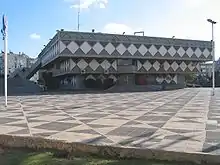

| Type | Name | Years |
|---|---|---|
| Head of council | Ben-Zion Mintz | 1936–37 |
| Head of council | Yisrael Ben Zion | 1937–39 |
| Head of council | Yisrael Rabinovich-Teomim | 1939–43 |
| Head of council | Eliav Levai | 1943–50 |
| Head of council | David Ben Ari | 1950–58 |
| Mayor | David Ben Ari | 1958–63 |
| Mayor | Menachem Rothschild | 1963–73 |
| Mayor | Yitzhak Walker | 1973–77 |
| Mayor | David Mesika | 1977–78 |
| Mayor | Menachem Rothschild | 1978–83 |
| Mayor | Ehud Kinamon | 1983–93 |
| Mayor | Yehoshua Sagi | 1993–2003 |
| Mayor | Shlomo Lahiani | 2003–14 |
| Mayor | Yossi Bachar | 2014–18 |
| Mayor | Tzvika Brot | 2018–date |
| Source: Bat Yam's mayors on the official city website | ||
Urban development
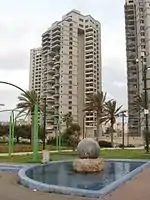
In 2016, the municipality approved an urban renewal plan in the Ramat Hanasi neighborhood, adding 950 high-end apartments. [17] In January 2018, a team headed by the National Economic Council was appointed to study the economic viability of building an artificial island off the coast of Bat Yam that could be used for an airport or industry.[18]
According to Bat Yam mayor Tzvika Brot, the city is looking for creative solutions to rebuild the city and preserve its economic independence.[19] The city has six beaches and a 3.2 kilometer (2 mile) long promenade along the Mediterranean coast that connects to the Tel Aviv boardwalk. [20]
According to a report in Ynet, Bat Yam has become a countrywide leader in urban renewal. Many of the city's older buildings are undergoing construction to strengthen their foundations, add floors and improve their appearance, and dozens of parks are being beautified and made accessible to visitors with disabilities.[21]
Health care
The Yehuda Abarbanel Mental Health Center is a psychiatric hospital founded in 1944 by the British Mandate authorities. Since the establishment of the state, it had been administered by the Israeli Ministry of Health. The hospital, named for Judah Abravanel, a Portuguese rabbi, Jewish philosopher and physician in the Middle Ages, provides hospitalization and ambulatory services to residents of Tel Aviv, Jaffa, Holon and Bat Yam coping with mental illness.[22]
Education
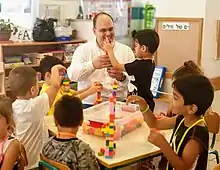
In 2008, the Weitzman-Albert Education Initiative headed by Jane Gershon, wife of fashion shoe designer Stuart Weitzman invested over $2 million in Bat Yam's Harel Elementary School, which received a top Education Ministry award for academic achievement and immigrant integration.[23]
In 2017, the percentage of high school students eligible for a bagrut matriculation certificate reached 86.3%, compared to the 68.2% national average. The number of high school students doing a five-point exam in mathematics is also on the rise thanks to a program inaugurated in 2015 in cooperation with the Donald J. Trump Foundation and Alliance Israélite Universelle to encourage excellence in math.[24]
Art and culture
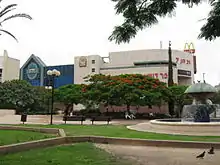
In the heart of Bat Yam is a three-museum complex known as MoBY. The main building, David Ben-Ari Museum for Contemporary art was established in 1961. The Rybak House and the Sholem Asch Museum house MoBY’s permanent collections and offer educational programs. [25]The Bat Yam Heritage Museum is adjacent to the municipal library,
The Bat Yam amphitheatre, also built in the 1960s near the beach, is a venue for concerts and public events. The International Street Theater Festival, the largest open-space performance art celebration in Israel, is an annual summer event in Bat Yam.[26]
The Ryback House showcases the work of Issachar Ber Ryback. The Yiddish writer Sholom Asch, who lived in Bat Yam in his later years, willed his home to the Bat Yam municipality, which turned it into museum.[27]
In 2008 the Bat-Yam International Biennale of Landscape Urbanism, which is devoted to re-examining urban spaces through art and architecture, was held in Bat Yam. In 2010, the second Biennale, "Timing" took place,[28] which featured site-specific installations from designers and architects from around the world.[29]
The Center for Urbanism and Mediterranean Culture is a research institute devoted to the creation of a new discourse in Israeli urban space. The head of the center is veteran Haaretz correspondent Avirama Golan.[30]
The city has two shopping malls, Kanyon Bat Yam, which opened in 1993, and Kanyon Bat Yamon.
Archaeology
In September 2011, an iron anchor dating to the Byzantine period was discovered off the coast of Bat Yam. According to the Israel Antiquities Authority, it was likely that of a boat that sank in a storm about 1,700 years ago and may be proof of an unknown ancient harbor on the coast.[31]
Architecture
Bat Yam’s old city hall, designed by Israeli architect Zvi Hecker in the 1960s, is a modernist building of reinforced concrete in the shape of an inverted ziggurat. [32]The design was chosen in a competition in 1959 which drew entries from the leading architectural firms in Israel.[33]
Beaches
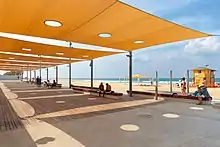
The location of Bat Yam on the Mediterranean makes it popular with beach-goers. Bat Yam has a 3.2 km (2 mi) long promenade along the ocean lined with pubs and restaurants. The city has six beaches, one of which is protected by a breakwater.
Bat Yam's Al Gal beach is a popular surfing spot with fairly consistent surf conditions, especially during the summer months.[34]Both Al Gal and Hagolshim are straight, exposed dune-backed beaches.[35]
Transportation
Bat Yam-Yoseftal Railway Station and Bat Yam-Komemiyut Railway Station opened in 2011 as part of the new Tel Aviv – Rishon LeZion West line.[36] Bat Yam will also be the terminus for the red line of the Tel Aviv Light Rail.
Sports
The city's major football (soccer) club, Beitar Tel Aviv Bat Yam, currently plays in Liga Leumit, the second level of Israeli football.
Twin towns – sister cities
Bat Yam is twinned with:
 Antalya, Turkey
Antalya, Turkey Aurich (district), Germany
Aurich (district), Germany Kostroma, Russia
Kostroma, Russia Kragujevac, Serbia
Kragujevac, Serbia Kutno, Poland
Kutno, Poland Livorno, Italy
Livorno, Italy Neukölln (Berlin), Germany
Neukölln (Berlin), Germany Valparaíso, Chile
Valparaíso, Chile Villeurbanne, France
Villeurbanne, France Vinnytsia, Ukraine
Vinnytsia, Ukraine

Notable residents
- Shay Abutbul (1983–), soccer player
- Yohai Aharoni (1986–), soccer player
- Michael Barkai (1935–99), Commander of the Israeli Navy
- Miri Ben-Ari (1978–), hip hop violinist
- Moshe Biton, soccer player
- Vered "Vardush" Buskila (born 1983), Olympic sailor
- Tomer Chencinski (born 1984), Israeli–Canadian soccer player
- Eli Cohen (1924–1965), Israeli spy[37]
- Meir Dagan (born 1945), Director of the Mossad[38][39]
- David D'Or (born 1965–), singer, composer, and songwriter.[40]
- Elana Eden (1940–), actress[41]
- Sharon Farber, composer
- Haim Gozali, mixed martial arts fighter
- Matt Haimovitz (1970–), US cellist
- Henryk Hechtkopf (1910–2004), illustrator
- Rita Katz (1963–), terrorism analyst
- Achinoam Nini (1969–), singer
- Peter Roth (1974–), pop singer and composer
- Gal Shish (1989–), soccer player
- Itzik Zohar (1970–), soccer player
References
- "Population in the Localities 2019" (XLS). Israel Central Bureau of Statistics. Retrieved 16 August 2020.
- Bat Yam – Israel’s New Riviera
- "Statistical Abstract of Israel 2012 – No. 63 Subject 2 – Table No. 15". .cbs.gov.il. Archived from the original on 2013-10-20. Retrieved 2013-08-08.
- Territorial stigma formation in the Israeli city of Bat Yam, 1950-1953
- Rabbi Dr. Haim Baruch Friedman, 1900-1985
- W. D. Battershill (1937). "Notice (23rd December 1937)". The Palestine Gazette. 745: 1287.
- Government of Palestine, Village Statistics, 1945, p52.
- Jewish National Fund (1949). Jewish Villages in Israel. Jerusalem: Hamadpis Liphshitz Press. p. 12.
- "Cleansing Jaffa: A detailed eye witness account, 202". Palestineremembered.com. Retrieved 2013-03-12.
- Britannica.com: Bat Yam
- OU mourns the passing of the Bobover rebbe
- "In a Strange Land: Israel's Vietnamese Community – CULTURE". Worldandihomeschool.com. Archived from the original on 2004-01-25. Retrieved 2013-03-12.
- שלומי לחיאני, ה"שריף" של בת-ים, זכה ב-86% מהקולות בבחירות
- "Bat Yam mayor plea bargain a good deal for all". Haaretz. 2014-05-09. Retrieved 2014-09-19.
- The changing face of Bat Yam
- MK Maklev visits Bat Yam, meeting with mayor and party activists
- Bat Yam urban renewal plan approved, Globes
- Gov't reviews plans for Bat Yam artificial island
- Government reviews plans for Bat Yam artificial island, Globes
- Bat Yam – Israel’s New Riviera
- בת ים מובילה בהתחדשות עירונית
- About Abarbanel
- NY fashionista adopts Bat Yam school, Jerusalem Post
- Excellence in education
- About MoBY
- Midnight East: International Street Theater Festival
- MoBY: Museums of Bat Yam
- "International Biennale of Landscape Urbanism". Metropolis Magazine. October 20, 2010. Archived from the original on October 24, 2010. Retrieved March 23, 2011.
- "Innovation by the Sea". Forward. October 19, 2010. Retrieved March 23, 2011.
- Urban Center, Bat-Yam
- Byzantine treasure found off Israeli coast
- Zvi Hecker
- Bat Yam’s Diamond in the Rough, Haaretz
- Surfing in Bat-Yam
- Stormrider Guide to surfing Israel
- Bat Yam: New Israeli Riviera
- Azoulay, Yuval (14 May 2010). "Unending agony for legendary spy Eli Cohen and his widow". Haaretz. Retrieved 30 August 2011.
- "מאיר דגן".
- "Real History and The Mossad's new chief".
- Agassi, Tirzah (March 25, 1994). "Going for Baroque Not!". The Jerusalem Post. Retrieved May 8, 2009.
- Parsons, Louella O. (27 March 1960). "Elana Eden: Hollywood's Newest Cinderella Story". The Milwaukee Sentinel. Retrieved 21 September 2013.
External links
| Wikivoyage has a travel guide for Bat Yam. |
| Wikimedia Commons has media related to Bat Yam. |
- Official website (in Hebrew)
- Reconstructing urban image through cultural flagship events: The case of Bat-Yam
